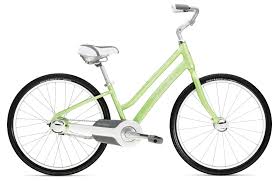My goal here is not to attempt a feminist screed, so I have focused this list on gender-specific standards that have largely gone unnoticed. Right-handed scissors are a good analogy. My left-handed mother always winced in agony whenever she used scissors, which, in the 1960s, were designed for the comfort of a right-hand dominated world. I felt her pain when I mistakenly used her coveted left-handed scissors. Now, all scissors seem to be ambidextrous. Maybe we can make the same thoughtful changes to the following:
1. Bicycles
When my trusty Schwinn bicycle crapped out after 30 years of faithful service, I decided to adopt my husband’s idle bicycle instead of buying a second one. How I miss the girl’s “step through” design that let me straddle the frame with both feet on the ground. All my stops and starts were effortless. Now I must fling my leg over the horizontal bar of the men’s “diamond frame.” It is a risky maneuver. Once one of my sandals went airborne as I swooped my leg up and over, and another time my pant leg got caught on the seat producing a dramatic tumble that brought traffic to a halt.
Why are there two different styles of bicycles? Why should I have to buy a second bicycle just for me? Why can’t my husband and I share? It seems that gender-specific designs are an artefact from the 1880s when bicycles first became popular. The long skirts of women made the leg swing impractical and probably scandalous. It is unclear why all bikes didn’t start with the practical step-through design, but now we are faced with changing a 100-year precedent. Not an easy task. The local bike store owner told me that few men will consider a “girl’s bike,” except for his older customers who have lost confidence in their leg swing and with it any macho pretensions. This is the same demographic that is considering an adult tricycle so they have bigger problems than a gender-neutral two-wheeler. From an inventory standpoint, the store owner would appreciate a single frame style. My suggestion was to stop giving bikes a gender identity and just refer to bicycle frames as either “step through” or “diamond,” pointing out the anatomic advantages of the step through. At least it’s a start.
2. Public Bathrooms
Yes, the gender identity of bathrooms has become the ridiculous surrogate issue for transgender discrimination, but I have railed against this situation for years, particularly when there is a line for the women’s bathroom but not the men’s. In the Stockholm airport, I entered what I thought was the women’s room to find a man washing his hands at a trough sink. As I backed out, he informed me that this was a common restroom and I happily skipped into an open stall. The major barrier to the shared bathroom is the men’s urinal. If we could get rid of that spectacle and create stalls for everyone there should be no need to have gender specific restrooms. I could even position this as a men’s rights issue. Men should have the same level of bathroom privacy – for both liquid and solid – as women.
3. Third Person Pronoun
The third person pronouns, i.e. he/she, are obviously gender-specific, a problem that is most acutely felt by writers when they don’t know gender of the person they are referring to. Consider this sentence.
“My daughter will be assigned a soccer coach today. I hope that ?he/she? will give her equal playing time.”
Believe me, this happens more often than you would think, requiring creative work-arounds. The most common is to revert to the plural, i.e. they/them, which is blissfully gender neutral.
“My daughter will be assigned a soccer coach today. I hope they will give her equal playing time.”
This is of course grammatically incorrect, and the sticklers at the SAT or ACT test will rip you a new one if this is your favored work-around. Other options involve arbitrarily picking a gender, or even alternating male and female in a show of gender equality, solutions that are simultaneously contrived, awkward and confusing.
Those who embrace the sexual spectrum have moved far beyond the pedestrian concerns of grammar. They favor a neutral pronoun to solve the limitations of the gender binary. Most recently, the transgender community has introduced “ze” (pronounced zee), creating the trio of he/she/ze. The student handbook at Grinnell College has embraced this approach. In addition, the scenarios describing sexual misconduct always use gender neutral names, such as Chris, Pat, Alex, Terry, so it is impossible to tell who is doing what to whom. It doesn’t matter – it’s all wrong.
4. Miss/Mrs./Ms/Mr.
The introduction of “Ms” in the 1970s addressed the demeaning distinction between married and unmarried women. However, the quartet still retains the binary gender structure. Why not get rid of the salutations entirely and refer to everyone by their first name? That has certainly been my approach; I always insist that the younger generation use my first name. The older generation is more problematic for me since I am still subject to the ingrained training that Mr./Mrs. is a sign of respect. However, the sad truth is that this concern is rapidly becoming irrelevant as I morph into the senior generation myself.
5. Household Chores
In the gender neutralization of household chores, women must be careful not to off-load only the unpleasant chores while refusing delivery of traditionally male chores. In our household, doing the laundry and emptying the dishwasher have become gender-neutral. Nick and I cook in parallel at dinner, each making our own distinct meal – we rarely eat the same thing. I have retained the female-dominated chores of changing the sheets, making beds, folding the laundry, setting the table, and tidying up before guests – all easy duty done on my own schedule. Plus, Nick does not appreciate that the made bed is a motivating reminder that every day is a fresh start, and he just can’t seem to remember the format of a set table – the fork goes on the napkin on the left, the knife, blade facing out, goes on the right and then the flanking spoon.
However, I am thrilled to say that I have off-loaded the grinding chore of grocery shopping to Nick. What have I acquired in exchange? Well nothing really. He is still responsible for taking out the garbage, manning the barbecue, and paying the bills. I can contrive excuses for this wondrously lopsided deal. He must take his dogs out in the morning anyway, so he might as well take out the garbage, I don’t eat much meat (although I cannot resist his barbecued ribs), and if I paid the bills we would be in danger of having the lights turned off (which did indeed happen in my single days). Yes, a very convenient and self-serving form of feminism.
Follow Liza Blue on:
Share:


